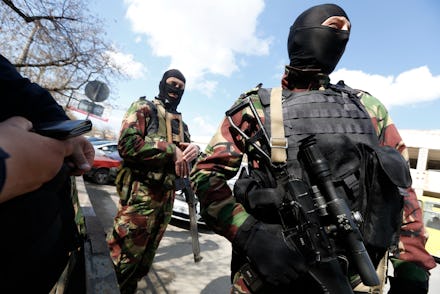26% of Americans Think That This Country Is Their Adversary

If the U.S. is looking for its biggest problem, Russia may be it. A recent study from the Pew Research Center shows that more Americans now see Russia as a serious problem or an adversary than not (69% to 32%). After Russian President Vladimir Putin's swift annexation of Crimea and alleged military invasion of Ukraine, which prompted an emergency NATO meeting, this comes as no surprise. The real standout comes from the findings on the U.S.'s perceived biggest foe.
For the first time since 2008, more Americans see Russia as the number one adversary than they do China. While by no means an indicator of Americans in general, 26% of surveyed Americans view Russia as an adversary, just above the 22% that see China as one. Forty-three percent of Americans see Russia as a serious problem but not an adversary, compared to 35% for China.
The analysis doesn't mean impeding nuclear war or a desire to blow our adversary into "radioactive dust," as Russian media has so kindly suggested regarding the United States. The numbers do, however, reveal an important trend. Since 2013, and more specifically since Russia annexed Crimea from Ukraine, public opinion on foreign threats to the U.S. changed dramatically.
In November 66% of Americans said China was an adversary or a serious problem versus the 54% who viewed Russia that way. Opinion has changed since then: now it's Russia that makes Americans most uneasy.
While Republicans are more likely than Democrats to view Russia as an adversary and support military intervention, all Americans are not keen on military intervention in Ukraine. Across the board only 6% want U.S. military intervention over Russia's actions. The majority (52%) don't want the U.S. to get too involved in the situation. About one-quarter of people say the U.S. should only consider economic and political options.
The report comes just after a previous Pew Research poll that found that 44% of Russians believe a Russian empire is natural. Will Putin's antics subside now that the Russian-leaning economic hub of Crimea is his? Or could growing evidence support the fears of nearly one-quarter of Americans who believe Russia is an adversary?
Public sentiment will be something to watch as international sanctions start to affect Russia. Attitudes on Ukraine will also be important, as the country desperately struggles to rebuild itself after anti-government protests and the government crackdown left the country a warzone. Until then, we know one thing for sure: Russia and the crisis in Ukraine have the world talking.